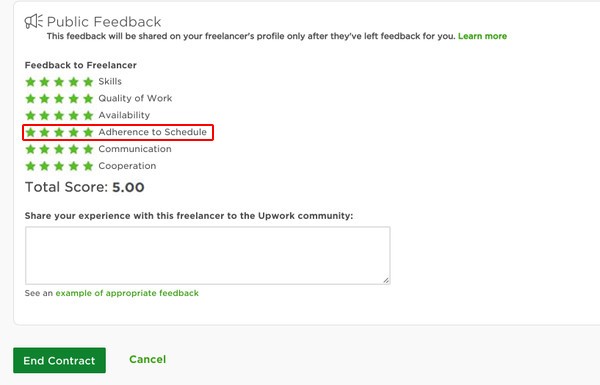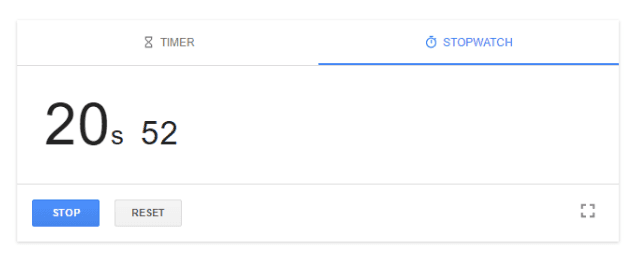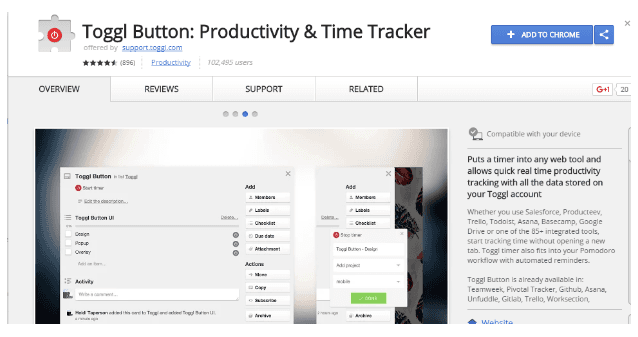There’s a saying that goes like this: “Deadlines are meant to be broken. And I just keep breaking them.”
Here's my alternative: “Deadlines are not meant to be broken. I’ll do everything I possibly can to always meet my project deadlines.”
I can’t stress enough how important it is to the success of your freelance business to always meet the deadlines you set with your clients.
Here are 4 reasons why meeting your deadlines is super important:
Your goal is 100% client satisfaction.
Great customer service helps grow your business.
Your single project is part of a larger project.
It builds credibility and trust.
1. Your goal is 100% client satisfaction.
Being on time is crucial for client satisfaction.
Take yourself as an example.
When you hire someone for a certain task and they don't deliver on time, how do you feel?
They made a promise to do X by Y date, but then they failed and explained in detail how their dog ate their keyboard.
Sure, life happens. Sometimes something comes up that you couldn't have anticipated. We're all human. And sometimes life is out of our control.
If this happens, tell your client there will be a delay due to X or Y. Be professional. Your client will understand if you explain the problem honestly and sincerely.
Your top goal in every project should be making sure your client is satisfied. Delivering on time is a major factor in satisfaction.
2. Great customer service helps grow your business.
Freelancers are service providers.
As a freelancer, your goal should be to always do your best for your client. Meeting deadlines is a big part of that.
As a service provider, you need to provide your clients with the end product on time.
How would you feel if you ordered groceries to be delivered to your home by 1 PM but the delivery man didn’t show up until 5 PM that day?
You’d be annoyed. You were depending on the store to deliver your items on time, so you could prepare dinner for your guests.
The same is true for us freelancers. If a client asks us to deliver certain tasks by X/Date, we need to complete the tasks by that date. If we don’t, the client will be disappointed and unhappy with our customer service.
And if you have a profile on an online freelancing platform such as Upwork, clients will leave public feedback on your work, in order to help others know if they should hire you or not.
Guess what one of the 5 factors in your customer service review is? “Adherence to schedule.”

It’s not there by chance – being on time is a key part of providing great customer service – and great customer service is key for growing a successful business.
3. Your job is part of a larger project
Sometimes our clients have plans that don’t involve us. Yes, it’s true. It might be hard to grasp, but life isn’t always about you or me. Don’t ask me why it has to be this way.
Joking aside, my point is that often our work is only part of a larger scheme of things. It's just one piece in a large puzzle that creates a picture.
For example, if a company depends on me to produce a promotional video for their new product that is due to launch by X date, then it is up to me to deliver on time.
My promotion video is only one factor in a larger campaign that includes: social campaigns, in-store promotions, Adwords ads, website banners, and more.
Consider your job to be just one piece of your client’s bigger project. This will help you understand the importance of your role in getting your tasks completed in time.
4. It builds credibility and trust.
If you stick to your word, you will build trust and credibility, which are two of the most important factors in getting repeat clients.
If your client knows that you always deliver on time, he will think of you first when he needs to hire someone for a future project - even if he has a tight deadline to meet. He will trust your word when you say you can deliver on time.
And not only that, if your client has a colleague who needs work done, he will feel comfortable recommending you as a trusted freelancer (see the word-of-mouth strategy).
It's simple math: when you trust someone you hired in the past, you'll be happy to return to that freelancer for more work later down the road.
Here are 7 actionable steps you can take to ensure you never miss a deadline.
1. Define the project timeline with your client.
The ideal situation is when the client shares the project requirements and his expectations for the job, and you as the provider suggest a doable timeline.
Often, the client won't know how much time is needed for each task. So the best way to approach any new job is to set the project timeline together with your client.
But if you've been freelancing for a while, you'll know that most of the time the ideal situation isn't the case, and the client has a specific deadline that's set in stone.
If that is the case, it is up to you to determine if you are able to get the work done on time or not. It is no shame to decline a project if you believe that you will not be able to meet the deadline.
Hint – if a client has a 24-hour deadline to create a 3-minute promo video for his product, you’re not going to get the work done on time. Or put simply, decline the project.
In my experience, each time I've declined a project due to an unrealistic deadline, the client has appreciated my honesty and has been able to reconsider his options.
2. Track your time and learn from experience.
Experience is key to estimating the amount of work involved in each task.
The more experience you gain, the easier it will be to know how long each task requires.
One way to know how much time is required is by tracking your time.
When you start working on a certain task, note when you started and when you finished.
You can use the most basic stopwatch like the one on Google (Type: set stopwatch)

Or more advanced tools like the Toggl Chrome extension that allows you to easily track time by project and task:

The more information you have on how long you work on certain tasks, the easier it will become to suggest doable timeframes and know if you’re able to meet certain deadlines suggested by your client.
3. Set milestones, not only the project deadline.
When you create the project schedule, don’t only define a project end date, but also set milestones for the work progress (“Milestone” is a task, a step, that needs to be completed before the project is finished).
By breaking down the project into milestones you add multiple secondary deadlines to the project, and this helps ensure you're on track.
For example, when I create explainer videos for my clients I don’t only define the project end date but also create multiple milestones along the way:
Script review
Storyboard design
Voice over recording
First video rough cut
…
…
…
Delivery of end product
It’s important to be realistic about the amount of work involved in each task, and the amount of time you’ll need in order to complete the project.
And as a general rule, it’s better to add one or two extra days to your estimate and then deliver the product before the deadline, than suggesting a short timeframe that will leave you out of time.
4. Feedback, revisions, and delays.
Feedback
Did you notice anything missing in the above list of milestones?
Many times the feedback and revision process is left out of the project plan and schedule. But successful projects require teamwork, and teamwork involves getting feedback from the client you’re working with.
If you’re working with a small business, the feedback process may be quicker. But if you’re working with a large corporation, feedback will probably be slower because your work needs to go through multiple departments before approval (i.e legal, branding, editors, marketing and so on).
Revisions
And then there’s the revision stage, which is where you work on the changes requested by the client, and send the project for a second, third and possibly even fourth round of review – each project will be different.
But all this takes time, and that time should be considered when creating the project plan.
Delays
Delays are different, and as mentioned earlier can depend on life circumstances happening.
But delays are not always the freelancer's fault.
Sometimes the client will not meet the deadline set for providing feedback, and there’s not much you can do about it. This might postpone the official deadline, but at least you were on time and the delay isn’t your fault.
I’m not saying you should add a milestone for ‘delays’. That wouldn’t be a smart move… but what you should do is plan things in a smart way, and learn to anticipate certain possibilities.
For example, if this is your third project with client X, and you know that client X always needs extra time to provide feedback – in the next project schedule add more time for feedback.
5. Schedule time for your tasks.
“Are you kidding me? A calendar? I’m a freelancer, I control my time. Who needs schedules?”
For years I didn’t have a schedule. I knew what needed to be done, and I planned things in my head.
But the more my business grew and the busier life became, the more I realized I must have a schedule and block off time for working on each project and task.
If you don’t have a favorite calendar tool yet, I highly recommend the Google calendar. It’s simple, free and robust. You can easily schedule meetings with people in different time zones, set recurring events, define multiple calendar categories, import useful calendars like national holidays and sporting events…
And if you do use Google Calendar, I highly recommend using the Chrome extension called Checker Plus for Google Calendar and the Month widget (Android) for extra productivity and ease of use.
6. Use a to-do list.
One of the best ways to ensure you’re making progress towards each milestone is by creating sub-tasks for each main task.
This will vary for each project type, but the idea is to break down each milestone into smaller manageable tasks.
By doing so each task will look less intimidating, and it will be easier for you to know exactly what needs to be done to ensure you’re getting closer to completing the milestone on time.
You can use task management tools like Any.Do, Evernote, Google Keep, or simply use pen and paper (my favorite method) to track your progress.
7. Take time zones and workweek.
If you work with clients that operate in different parts of the country, or even different countries, you need to take time zones and working days into account.
Is your client also on a Monday-Friday workweek? Or does he work Sunday-Friday?
What time zone is she in? Does she expect you to be available during certain hours?
Do either you or your client have vacation or national holidays coming up?
All these need to be taken into account when working out the project plan. The more details you have, the better the project plan will be. It’s not unreasonable to let your client know that you’ll be off work during X/Date because of a national holiday.
Key takeaways:
Deadlines are not meant to be broken, and there are 7 actions you can take to make sure you’re always on time.
Set the project timeline together with your client.
Track your time, learn from experience.
Define milestones, not only the project deadline date.
Take feedback, revisions and delays into consideration.
Schedule time to work on each task.
Keep track of your tasks with a personal to-do list.
Take time zones and working days into account.
“Deadlines are not meant to be broken. I’ll do everything I possibly can to always meet my project deadlines.”